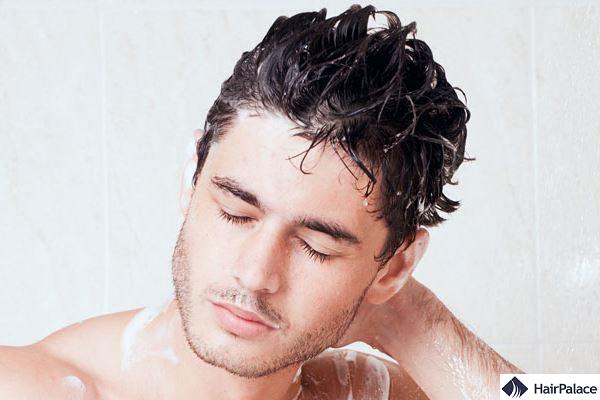How to Maintain Healthy Hair After your Transplant

A hair transplant is a cutting-edge solution for baldness or thinning hair, but what do you have to do to keep the results at their best after the procedure?
It’s a common question, and with good reason. You want your rejuvenated hair to stay healthy, full and youthful for years to come.
The post-surgery process is always daunting no matter how safe the treatment, but HairPalace is committed to making it as easy as possible for you.
So, read on to learn how to maintain healthy hair after your FUE hair transplant in Budapest!
- How should I handle my hair?
- How should I was my post-transplant hair?
- When can I get my new hair cut?
- What about hats sunlight and fitness after my hair transplant?
- What foods should I eat after my surgery?
How Should I Handle My Hair?
It’s essential to be gentle and cautious when handling your locks after a hair transplant.
This is particularly true when washing your hair, as wet strands are much more fragile than dry ones.
Take care to avoid cotton towels with harsh, coarse textures.
You might be used to simply rubbing your hair vigorously to dry it quickly. However this can be a big mistake; this can be a tough habit to break, but it’s vital you do.
One great alternative is to dry your hair with an old T-shirt instead, with soft movements.
If your hair’s longer and prone to tangles, use a wide-toothed comb or brush. This will keep it straighter before you wash it.
While you’ll want to keep running your fingers through your hair and playing with it as it continues to grow, avoid pulling on it too harshly.
Never scratch at the area of the scalp treated and sleep with a minimum of two pillows under your head, to keep it elevated.
How Should I Wash My Post-Transplant Hair?
We advise that you keep water away from your hair throughout the first seven days after your surgery, so certainly avoid washing it during this period.
We will provide you with a saline solution to spray onto your hair on an hourly basis.
You’re unable to use shampoo during the second recovery week too, though the crusts surrounding your new hairs should be washed off gently.
Baby shampoo is acceptable for your third post-op week, and you can start using ‘adult’ shampoo at the one-month mark.
Be careful with shampoo, though: applying too much too often can strip your hair of its natural minerals and oils; these are your body’s way of keeping your hair healthy.
Switch to a gentle shampoo formulated with natural ingredients, suited to your hair type (oily or dry).
Always follow our guidance on washing your hair after your restorative surgery. If you’re not sure of something, just ask!
When Can I get My New Hair Cut?
It’s natural you’ll want to have your hair cut, but this should be left until after one month of recovery.
Both the recipient and donor areas can be tended to.
New hairs will be growing after this time, and the overall thickness will continue to improve as the results become more visible.
You might find such a long wait difficult if you’re used to keeping your hair short, but it’s crucial to follow our guidelines.
What about Hats, Sunlight and Fitness after My Hair Transplant?
Love to wear baseball caps or beanies? Worship the sun? Passionate about building up a sweat or throwing yourself into sports?
Sadly, you’ll have to put all of these on hold for a while.
No hats should be worn for the first three weeks of your post-transplant recovery, and direct sunlight must be avoided for between six and eight weeks (along with exposure to cold and windy conditions).
A loose cap or headscarf can be worn after three weeks to protect your hair from the elements.
You need to keep clear of physical exertion for the first three weeks too.
This is a challenge if you love to keep fit, but sweat on your scalp should be kept as minimal as possible.
What Foods Should I Eat After My Hair Transplant Surgery?
The old cliche “you are what you eat” is true: your diet can have a strong impact on your hair, and adopting a healthier lifestyle after your transplant can help to keep it in good condition.
Chips, pizza, burgers, chocolate bars, cake — we all love at least one of these treats, but excessive consumption will do little good for your hair!
Instead, focus on eating more of the following foods:
- Greek yoghurt: this is rich in protein (essential for good hair growth) and vitamin B5 (AKA pantothenic acid), which may reduce your risk of hair loss. Greek yoghurt happens to be delicious and versatile; try eating it with fruits, granola, cereal and nuts!
- Spinach: spinach is packed with iron, folate, vitamins A and C, and beta carotene. These can contribute to a healthy head of hair and encourage moisturisation of the strands, keeping them strong.
- Cereals: aim to eat cereals which have been fortified with iron, to combat hair thinning and loss. Cereal makes a good, light snack at any time of the day for a little extra iron.
- Sweet potatoes: as with spinach, sweet potatoes are a great source of beta carotene, which your body will transform into vitamin A; this encourages your scalp’s glands to produce more sebum and prevent the hair getting too dry.
- Eggs: one of the main components of eggs is biotin, which helps to prevent hair loss. You can eat eggs in plenty of different ways too, which stops them getting dull!
- Blueberries: you’ll get plenty of vitamin C from these, benefitting your scalp’s circulation. You can combine blueberries with Greek yoghurt for a delicious, hair-friendly breakfast or dessert.
- Walnuts: fatty acids, vitamin E and biotin can all be found in walnuts, keeping your hair defended against damage.
As you can see, there are many simple ways to maintain healthy hair after your hair transplant surgery.
The HairPalace team is committed to providing you with all the information, advice and recommendations you need to keep your post-procedure results at their best.
Want to learn more about our hair restoration FUE treatments? Please don’t hesitate to get in touch with us today!
Last medically reviewed on August 2nd, 2024
- Sinclair RD. Healthy hair: what is it? J Investig Dermatol Symp Proc. 2007 Dec;12(2):2-5. doi: 10.1038/sj.jidsymp.5650046. PMID: 18004288.https://pubmed.ncbi.nlm.nih.gov/18004288/
- Park AM, Khan S, Rawnsley J. Hair Biology: Growth and Pigmentation. Facial Plast Surg Clin North Am. 2018 Nov;26(4):415-424. doi: 10.1016/j.fsc.2018.06.003. Epub 2018 Aug 16. PMID: 30213423.https://pubmed.ncbi.nlm.nih.gov/30213423/
- O'Connor K, Goldberg LJ. Nutrition and hair. Clin Dermatol. 2021 Sep-Oct;39(5):809-818. doi: 10.1016/j.clindermatol.2021.05.008. Epub 2021 May 24. PMID: 34785008.https://pubmed.ncbi.nlm.nih.gov/34785008/


